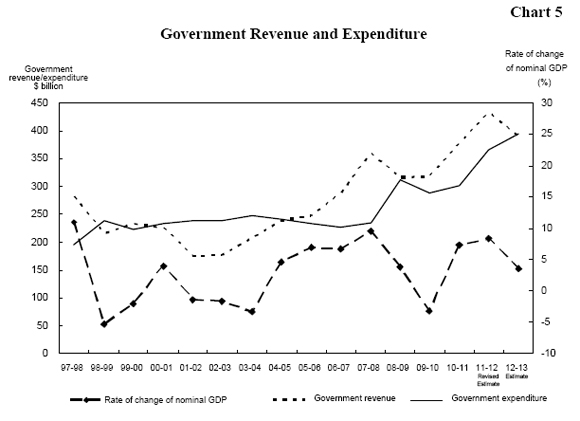208. Government revenue is susceptible to fluctuations in the external economic environment, but it is undesirable to make any drastic changes to expenditure during periods of adversity. That is because almost 60 per cent of our recurrent expenditure is provided for education, health and social welfare, which are closely related to people’s livelihood. Reducing expenditure during an economic downturn will only add hardship to our people. Instead, we shall increase government expenditure, and our adequate fiscal reserves can provide the headroom for financial manoeuvres under such circumstances. In times of reduced revenue resulting from an economic downturn, the fiscal reserves allow us to maintain all the necessary public services, and adopt counter-cyclical fiscal measures to alleviate people’s burdens, stimulate the economy and invest in the future. Take 2009 as an example. When GDP was forecast to contract by two to three per cent that year, we adopted counter-cyclical measures. We increased government expenditure and relieved the pressure on our people. The strategy also created conditions favourable for the subsequent economic recovery.

209. During the consultation period, there were quite a number of views on the appropriate level of public expenditure as a proportion of GDP. The share of public expenditure is close to 20 per cent of GDP in recent years. Our policy is to prevent overspending by the Government, which will stifle the development of the private market. We strive to strike a proper balance between increasing government expenditure and maintaining a low tax regime. In the event that our expenditure continuously exceeds this level, we shall need to explore ways of increasing our revenue to maintain a higher level of expenditure. The European and the US governments have to resort to fiscal austerity measures of all kinds to tackle the debt crisis caused by their escalating expenditures in recent years. This illustrates the importance of upholding fiscal principles and maintaining the health of our public finances.
210. However, I must state that we can go beyond this level on a need basis. In fact, in four of the past ten years, public expenditure exceeded 20 per cent of GDP. This is also the case for the estimated public expenditure for 2012-13.
211. In figuring out the level of government expenditure, we must take into account the fact that our Government adopts a cash-based accounting system with no provision for our liabilities, contingent liabilities and commitments, including the government bonds issued in 2004, the loan guarantees for SMEs, infrastructure commitment and civil service pension. As at the end of March 2011, the present value of public officers pension obligations was over $530 billion. Further increase is expected in the coming years. As for infrastructure, the value of capital projects approved by the Finance Committee and to be submitted to this Council within the year has reached $400 billion. The loan guarantees for SMEs have surpassed $70 billion. If government revenue drops due to any economic downturn, we shall have to draw on our fiscal reserves to pay for these expenditure.
212. Structural changes in the community such as an ageing population will also bring pressure to bear on public finances. We estimate that our population aged 65 or above will increase from the current 0.9 million to 2.1 million in 2030. To cope with this long-term issue, both the community and the Government will have to make sustained efforts in various respects. Measures implemented in certain policy areas, such as the healthcare financing reform, will help us get ready for the future. We also need to maintain adequate fiscal reserves if we are to take on the challenges posed by an ageing society. |
